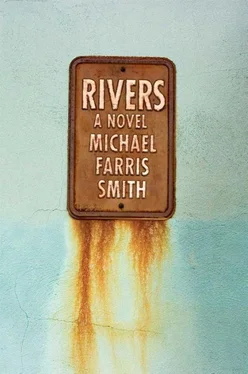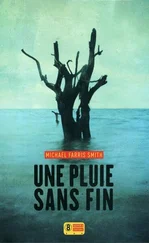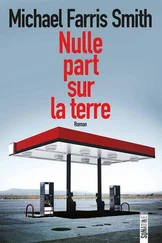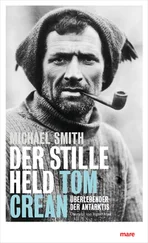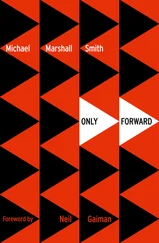“You think they’d let me keep him?” Nadine asked.
Kris smiled. “Who you talking about?”
“Whoever is where we take him. Doctor, I guess. First thing they ask is who’s the momma.”
Little sucking sounds came from the infant. She was a rough woman who had lived a rough life, but there was something tender in the way she looked at the baby boy.
“I think so. I think that’s a good idea. He can be a big brother,” Kris said.
Nadine grinned, her harelip snarl disappearing some in the rise of her cheeks. “Don’t be none of my brothers,” she told the baby.
The fire was warm and the room dry.
“It sounds kinda weird, don’t it?” Nadine said.
“What’s that?”
“Making plans.”
Kris folded her arms across her stomach. Rocked back and forth. She nodded and stared at the fire. When the baby finished with the bottle, Nadine propped him on her shoulder and patted his back and he burped and threw up down her back.
“Aw, hell,” Nadine said and the baby began to wail.
Kris took the baby from her and Nadine found a shirt on the floor and wiped herself. The baby screamed and Kris got up and walked with him and tried the bottle again but he wouldn’t have it.
Nadine tossed the dirty shirt aside and got up and took the baby from Kris. “Sit down,” she said. “You don’t need to be walking around no more than you got to.” She cradled the baby and marched around the firelit room, bouncing him and half-singing, and the crying eased some.
“He just don’t look right to me,” Nadine said.
“Babies puke,” Kris answered.
“I know they puke but he won’t quit hollering. He’s so damn miserable.”
“Just keep bouncing around. At least that slows him up.”
Nadine walked him and talked to him. He cried, paused and listened, and cried again. Kris lay down and closed her eyes. Nadine touched his red head and tried to get him to suck on her fingertip but he didn’t want it. Didn’t want anything but to scream. She paced the house, walked in and out of the dark of the other rooms, and felt the child against her. As she rocked him in her arms in rhythm with her steps, she allowed herself to imagine somewhere new, without the crying, the boy learning to walk, the babble of his voice, his tiny hands reaching out for her.
THE TRIP WAS HALFWAY ALONG and they decided it was time to do what tourists are supposed to do. They armed themselves with the guidebook and maps and the camera and spent the next three days going to the major and minor museums, the plethora of cathedrals, the war memorials, the Venetian landmarks. They shopped for souvenirs, buying key chains and art prints and T-shirts. They found local markets and Elisa bought a handmade scarf and tablecloth and Cohen got himself a leather belt and he bought Elisa a silver ring that he planned to give her on the plane ride home. They rode the water taxis across the channel and through the major canals to save themselves time and to keep on track. The overcast skies remained and they were chased into a café now and then by a rain shower but the showers were brief.
At the end of the three days, after having seen all they felt like they needed to see, after having bought keepsakes and taken hundreds of pictures, they returned to the earlier pace of sleeping late and perusing the city looking for a good place to sit. A good coffee. A good bottle of wine. A good meal. These were the priorities.
They sat outside at a table in Palazzi Soranzo. Elisa had her feet propped in an empty chair and she wore a Band-Aid on the cut over her eye. Cohen leaned back with his hands behind his head. A carafe of red wine and a carafe of water sat on the table. It was a busy plaza and across the way they watched members of an orchestra take instruments from black cases and sheet music from black folders and begin to get comfortable in their seats. On the stage were several levels of stairs meant for a choir, and milling around the stage and around the center of the plaza were dozens of children in white robes.
“They’d better hurry,” Cohen said, looking up at the cloud-covered sky.
“I hope it holds off. I wanna hear them,” Elisa said. He took the wine carafe and refilled their glasses.
The orchestra began to warm up. The violins and the deep throbbing of the kettle drums, the higher-pitched clarinets and the strumming of harp strings, the tremble of the oboes. As if the instruments had sounded an alarm, the children in robes began to migrate toward the back of the stage. A woman in a sleeveless red dress ushered them and then a man in a gray suit passed by the orchestra and made sure each musician saw the three fingers he was showing.
“That’s weird,” Elisa said. “I just thought about something I haven’t thought about in a long time.”
Cohen reached for his wineglass and asked her what she remembered.
“Something I read back in college. Death in Venice. You ever have to read it?”
“If I did, I don’t remember it.”
“Well, then you didn’t. Because if you read it, you wouldn’t forget it. Especially now that we’re here. I can’t believe I just now thought about it.”
“So. What was it about? A double murder?” Cohen asked.
She stared across the plaza toward the children. “No,” she said flatly. “It’s about this man, an old man. He was an artist or maybe a writer. Anyway, he decides to come to Venice for a vacation and he ends up seeing this boy, this beautiful young boy and he falls in love with him. Crazy love. He becomes completely obsessed by this boy.”
Cohen sipped from his glass of wine. “Old pervert,” he said.
“But that’s it,” Elisa said, turning from the children and looking at Cohen. “He wasn’t an old pervert. It seemed that way at first but if you really looked at it, when he thought about the boy, it’s like he was thinking about a work of art or a sculpture or something. I think I remember something about him comparing the boy to a Greek statue. That’s how it started out. He was an artist and he saw the boy as art. But then when he started following the boy around was when he began to lose it some. He watched the boy all the time. Followed him in and out of the hotel, around the city, to the beach. Wherever. I think he even went to try and leave but couldn’t.”
The sounds of the tuning orchestra began to lessen and the children, who earlier stood in a huddled mass, had broken into lines and were waiting behind the stage with their hands at their sides. The woman in the red dress had come onstage. Across the front of the stage were four microphone stands and she went to each one to make sure that they were on and ready.
“What’d the boy do?” Cohen asked.
Elisa shrugged. “Nothing, really. He noticed the man but didn’t seem concerned. He had a governess or servant and they noticed him following them around but nobody ever said or did anything. The whole thing was strange. He loved the boy, it seemed like to me. But not in some weird sexual way. He just loved him. At least that’s what I thought.”
Elisa took her wineglass but didn’t drink. She held it up and watched the wine move around in it. Then she set it back on the table.
“The end?” Cohen said.
She shook her head. “The strangest part to me was that the old man found out there was a plague in Venice but that everybody was keeping it quiet so the tourists wouldn’t get out of town. The boy and his family were staying at the same hotel he stayed at, and I said he loved the boy, but when he found out about the plague, he didn’t warn the family. He didn’t do anything to try and protect the boy, though he knew that the plague was already killing people.”
“Did the old man leave?”
Читать дальше
